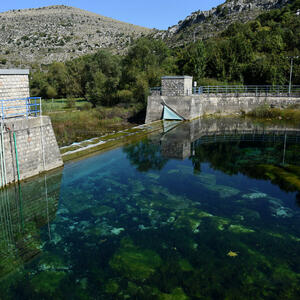The President of the Board of Directors of the Regional Waterworks, Zoran Lakušić, said that the decision of the Ministry of Spatial Planning, Urbanism and State Property, which through its Urban and Construction Inspection, issued a decision regarding the ban on the construction of an asphalt base with accompanying facilities of the company "Tehnoput", clearly reflects the basic principle functioning of the Ministry, which is the preservation and protection of natural resources, such as the "Boljeestra" water source, which "deserve the highest level of attention and care."
"Through this decision, the Ministry has sent a clear message that the protection of natural resources and the preservation of the environment is of fundamental importance. This is an important step towards the preservation of nature and the environment, and proof that the Ministry is committed to the care of natural resources and the preservation of the ecological balance," he announced. Lakušić.
In this way, he says, the Ministry made it known to "everyone who wants to jeopardize the basic concepts of the ecological state of Montenegro, violate laws and do not respect high ecological standards for their own profit, that there will be no compromise with them".
Such decisions, he adds, give rise to hope that in the coming period, every attempt to degrade the sanitary protection zones of the "Boljeestra" source and endangering the environment will be stopped.
This statesmanship confirmed the long-standing efforts of the Board of Directors and the Regional Waterworks to uncompromisingly protect the state and public interest, i.e. the safe water supply of the Montenegrin coast, through the struggle to preserve the sanitary protection zones of the "Boljeestra" source, said the president of the board.
According to Lakušić, the Ministry of Spatial Planning, Urbanism and State Property made a responsible decision to protect the rivers Cijevna, Morača and the source of the Boljesestra. "The residents of Cijevna, who have suffered the impact of asphalt bases for a long time, can now finally breathe a sigh of relief from the possibly negative consequences of the 'Tehnoputa' asphalt base. However, it is necessary to start the process of moving the 'Bemax' and 'Puteva' asphalt bases from these locations to more adequate locations, with considering that these companies, as far as is known, do not have a water permit," he states.
He said that Minister Janko Odović, the Ministry of Spatial Planning, Urban Planning and State Property, the Ministry of Tourism, Ecology, Sustainable Development and Development of the North and the Government in the Regional Water Supply have a dedicated partner to provide the missing amount of water to the municipalities of Montenegro through the protection of the sanitary zones of the spring "Boljesestra". coast, and in this way ensure their development and the development of tourism as a key branch of the economic development of Montenegro.
Lakušić said that the prerequisite for an orderly water supply of the Montenegrin coast is zero tolerance towards violation of sanitary protection zones because, "due to their gross violation, i.e. ecocide" in the bed and on the banks of the river Morača and the source of the "Boljesestra", the Regional Water Supply is forced to invest significant financial resources in order to rehabilitate them, as well as to provide an additional amount of water.
"The Regional Waterworks expresses concern over the fact that there are still institutions and individuals who may not be fully aware of the dangers and consequences of granting a permit for the operation of a plant such as an asphalt base near the Cijevna and Morača rivers," announced Lakušić, saying that such plants can have a significant negative impact on the environment, especially on water resources and on the source of "Boljeestra", and that it is essential to adequately understand and take into account the potential dangers when making decisions on permits for such activities.
Bonus video:





